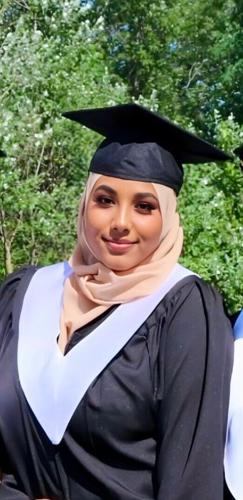A 22-year-old Toronto woman is recovering from a brazen hit-and-run in Dallas, Texas — stuck in the United States with a shattered foot, emotional scars and more than $100,000 in medical bills.
Tesnim Hussein says she did not have travel insurance. She never thought about needing it.
“I was really stressed,” she told the Star. “It’s a lot of money to have to pull out of nowhere. We came for just a quick trip, to see our family, to have fun, and now I’ll end up staying here for a month.”
On July 1, Hussein travelled south for the 27th annual Harari Sports and Cultural Festival, a weeklong celebration of her Harari culture, community and history, held in different cities worldwide. The event is something she looks forward to each year, a chance for her to connect with her roots and catch up with family.
This year, the timing made it extra special — Hussein and her cousin had just graduated from university, and she’d recently been promoted to manager at the fast-food restaurant where she works.
“I had a week of training left before I went for my vacation,” she said.
But on the night of July 3, the course of that trip — and her summer — changed dramatically.
After a soccer game at the University of Texas (UT) at Dallas campus, Hussein and her cousin, Khadija Ahmed, 22, said they were struck in the nearby parking lot by the driver of a white sedan. Before they could react, the women were thrown onto the hood and then slammed onto the pavement.
As the car drove off, multiple passengers — they appeared to be teenagers — rolled down the windows and “recklessly” launched fireworks into the crowd, according to Hussein and three other witnesses.
A spokesperson for the UT Dallas police department said the driver, a 17-year-old boy, has been arrested and charged with failing to stop and render aid at an incident resulting in serious bodily harm. The investigation is ongoing.
The incident left Hussein with a crushed left foot, four dislocated bones, a fracture and bruising and scars along the side of her body. She has undergone two surgeries and requires a third in the coming months. Doctors have told her she cannot fly home to Toronto until the end of July because it’s too risky — she could develop blood clots.
Financial burden
The physical toll is one thing, but the financial burden adds another challenge for Hussein and her family.
As a Canadian citizen, Hussein said her Ontario Health Insurance Plan (OHIP) does not come close to covering every dollar of her U.S. hospital care. Without travel insurance, she and her family are now responsible for more than $100,000 (U.S.) She said her situation is an unfortunate reminder of the importance of buying additional protection when travelling abroad.
“Not buying travel insurance was a mistake I think a lot of people make, not because we’re careless, but because you just don’t expect the worst to happen,” she said.
Hussein said she’s travelled plenty before without any issues, and thought she’d be fine this time, too. “It never crossed my mind that something so serious could happen.”
By sharing her story, she hopes it helps others think twice and protect themselves. “But more than that,” she said, “I hope people can understand how quickly life can change and how much support really matters when it does.”
Will McAleer, executive director of the Travel Health Insurance Association of Canada, described the U.S. as “the most expensive place on the planet” for receiving medical care. He said a Code Blue emergency, which usually means a patient is having a cardiac or respiratory arrest, can cost as much as $10,000 a day or even per hour.
OHIP’s Travellers Program can cover some out-of-country emergency services, but it’s limited. According to its website, the treatment or service must meet specific criteria, including being medically necessary and received at a licensed hospital or health facility.
The plan says it will reimburse outpatient visits at $50 Canadian each day or the amount billed by the hospital, whichever is less. It can also pay up to $400 Canadian each day for in-hospital services, depending on the level of care required.
Even if a patient is eligible for that higher payment, McAleer said the coverage amounts to a very small portion of the total costs incurred in places like the U.S. It also takes a long time to get reimbursed, he said.
“We know that, on an average, you might get three to five per cent of the cost of a medical emergency,” subject to that cap, McAleer said.
Hussein was discharged from the hospital last week and is recovering at a relative’s home in Dallas until she can return to Toronto.
Recounting the events that unfolded the night of July 3, she told the Star she doesn’t remember certain parts. She’s looked to Ahmed and other witnesses to help fill in the gaps.
‘They just kept going’
It was around 11:30 p.m. Dozens of people had finished watching the final match in a soccer tournament and were headed to their cars. Hussein and Ahmed were chatting with other attendees while their cousins went to get the car.
Just as the women were walking to meet them, a white sedan with tinted windows started trailing slowly behind them. “I thought maybe they were trying to manoeuvre around the people,” Hussein said. “It was a little crowded.”
Her cousin, Ahmed, noticed the glare from the headlights. “Oh my god,” she recalled thinking. “This car is so bright.”
That’s when the car bumped them.
Just as Ahmed turned around, she said the car accelerated again. This time, it was much faster. She and Hussein rolled onto the hood and hit the windshield, but the driver didn’t stop. “They just kept going,” she said.
Suddenly, the driver slammed on the brakes “really hard,” said Sara Ali, 22, who was watching the incident unfold from her car just metres away.
Before Ali could do anything, she said passengers in the sedan launched “huge fireworks” from the windows into the crowds.
At this point, Ahmed said she was on the ground. Her hijab had come off. She remembers looking up and seeing the headlights. Worried the driver was going to strike again, she said she screamed at Hussein to “get up” and ran for cover behind another vehicle.
Hussein couldn’t move; she was “screaming in pain” recalled Ahmed. The driver of the sedan then reversed and sped off.
Bystanders immediately called police and rushed to help Hussein.
Weeks later, Hussein and Ahmed said they are still in shock, unable to comprehend why the suspects would do such a thing — and why she and her cousin were the targets.
“Just throwing fireworks is one thing, and then to hit someone (with a car) and keep on going. There was no remorse,” Ahmed said.
Hussein said she hopes justice is served to prevent a similar incident from happening. “If they could do that to us, they can do that again.”
In the wake of the incident, Hussein’s family has organized a GoFundMe page to help offset the rising medical bills. It raised more than $55,000 as of Wednesday afternoon.
In the message on the fundraiser page, the organizer stated that the donations would help cover the costs of surgeries and medical procedures, the hospital stay, post-operative recovery and mobility support, including crutches and therapy.
“Tesnim didn’t ask for this,” the message reads. “She was a victim of a reckless, public act — something no one should ever have to go through. Her story has been witnessed by many, and now we ask you to be a part of her healing journey.”





























To join the conversation set a first and last name in your user profile.
Sign in or register for free to join the Conversation